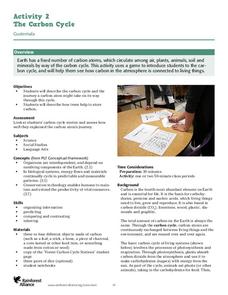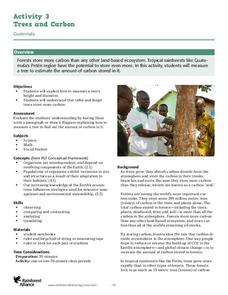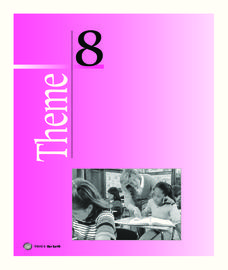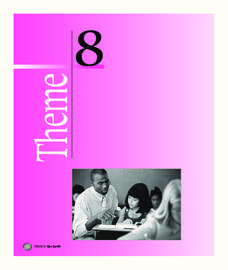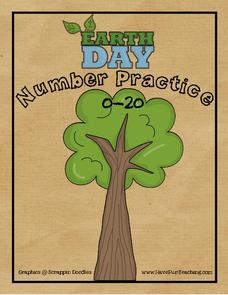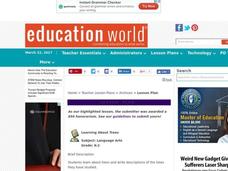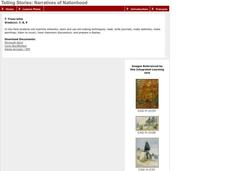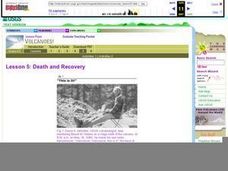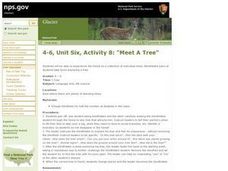Rainforest Alliance
The Carbon Cycle
Scholars learn about the carbon cycle, play a carbon cycle game, and then write a story based on their role as a carbon atom during the game. After the writings, pupils analyze the carbon cycle by leading a class discussion on the material.
Rainforest Alliance
Trees and Carbon
You'll find everything but the kitchen sink here ... or just a carbon sink. In the activity, pairs or groups of middle school learners go outside and measure a tree's circumference and height to estimate its carbon storage potential and...
Itsy Bitsy Fun
Halloween Color By Numbers
Bring some Halloween math to the class for a spooktacular addition to your instruction. Here, scholars color by number to uncover four spooky scenes including a pumpkin, a bat flying across the moon, haunted trees, and a cat.
Rainforest Alliance
Colombia Biodiversity
How diverse is the rainforest? How much more diverse is a rain forest than a temperate forest? Explore these focus questions in a lesson that explores the plants, animals, and insects in forests. After listening to a reading...
Rainforest Alliance
Get in Touch with Nature
Take a trip to the Colombian rainforest through the sense of touch. Here, class members discover what's inside a mystery box: wood, cinnamon, Brazil nuts, a banana, and orange. Then, the class takes a trip outside for a tree rubbing...
Houghton Mifflin Harcourt
Our Earth: Extra Support Lessons (Theme 8)
Plant or animal? As part of the Houghton Mifflin Harcourt thematic unit Our Earth, learners engage in activities and exercises that provide them with extra support to master the concepts in the unit.
Houghton Mifflin Harcourt
Our Earth: English Language Development Lessons (Theme 8)
Language learners receive support with the concepts in the Houghton Mifflin Harcourt thematic unit Our Earth from this 32-page packet of exercises and activities designed just for them
Houghton Mifflin Harcourt
Our Earth: Challenge Activities (Theme 8)
This packet, the first in the series of support materials for the Houghton Mifflin Harcourt thematic units on our earth, contains enrichment activities for learners who have mastered the basic concepts of the lessons. Kids...
PreKinders
Parts of a Tree
Don't bark up the wrong tree with this set of cards! Seven cards present different parts of a tree, including a trunk, branches, and leaves. A great addition to your science or language arts lesson.
Have Fun Teaching
Earth Day Number Practice 0-20
How many trees can your pupils plant? Practice numbers 0-20 with several related activities. For the first, kids match images of trees to numbers. They then match the number symbols to number words, using a word bank. The final activity...
Berkshire Museum
Adopt a Schoolyard Tree
Help young scientists connect with nature and learn about trees with a fun life science lesson. Heading out into the school yard, children choose a tree to adopt, taking measurements, writing descriptions, and drawing sketches of it in...
Curated OER
How Can Clear of Tress Destroy a Community?
Fifth graders brainstorm the relationship between trees and humans to determine how humans benefit from trees and how they benefit from us. They discuss oxygen/carbon dioxide exchange, soil stablization, animal habitat, shade, medicine...
Curated OER
Does The Type of Mulch Used Affect Plant Growth?
Learners measure, record and graph the plants they grow in a controlled setting. They feed and water the plants as needed and use the scientific method to evaluate the growth.
Curated OER
Learning About Trees
After looking at pictures of trees, discussing tree growth, and identifying the parts of a tree, lead your class on a nature walk and have them collect samples and record their observations. They then work in pairs to polish the...
Curated OER
Producers to Consumer - Milk and Trees
In this producers and consumers worksheet series, students make two small books; one about how milk is produced and processed starting from cows, and the other is about how trees become lumber and other products. They cut out consumer...
Curated OER
Trees-Whiz
A unique series of lessons on trees is here for you. The series has learners utilize visual art, musical compositions, and literature in order to examine how trees have a place in a culture. The classic tale, The Giving Tree is one...
Curated OER
Death and Recovery
Mount St. Helens erupted on May 18, 1980, devastating plant and animal life for miles around. Two activities are included in this lesson plan. In one, learners evaluate tree rings to determine the age of a tree and the year of a volcano....
Curated OER
Forest Fun
Learners explore orienteering and how to use a compass. They explore the importance of forests and identify some of the trees in a local forest.
Curated OER
Science: Schoolyard Trees
Sixth graders choose specific trees to research while taking a nature walk around the schoolyard. They discuss tree and leaf parts and observe various types of leaves. After writing their reports, 6th graders present them to the class...
Mr. Nussbaum
Redwood National Park Reading Comprehension
An interactive tests scholars' reading comprehension skills. Young learners read an informative passage about redwood trees then respond to five questions. Feedback appears instantly.
Twisty Noodle
Who Is in the Tree? Book
Practice the word who with your class by asking them to complete the sentences here and put together the pages into a little book. Kids can also color the pictures to add a little extra something to their books.
Curated OER
Meet A Tree
Young scholars explore different types of trees with their senses. In this nature instructional activity, students play a game in which pairs use their senses to explore trees, blindfolded. Young scholars then must find the tree they...
Curated OER
Forest Communities
Young scholars identify tree specimens. In this tree specimens lesson, students collect different parts of a tree from the areas around the school or their home. They then work in groups to create booklet that identifies tree...
Curated OER
Painted Plant Prints
Students identify local trees and plants by their leaf shapes and structures, foliage patterns, and colors. They recognize different leaf vien structures, and make labeled prints to show each of them. Students study their leaves and...


